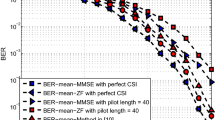Abstract
In point to point MIMO systems, uniform channel decomposition (UCD) has been proven to be optimal in bit error rate (BER) performance and strictly capacity lossless when perfect channel state information (CSI) are assumed to be available at both the transmitter and the receiver side. However, in practice, CSI can be obtained at the transmitter if there is reciprocity between the forward and reverse channels in time division duplex (TDD) systems or can be conveyed from the receiver to the transmitter via a feedback channel. In any case, channel estimation error is inevitable. In this paper, a novel robust UCD scheme and corresponding optimal robust power allocation are proposed, which are capable of improving the BER performance in the context of imperfect CSI compared with the conventional UCD scheme and the robust precoding scheme proposed by Amir D. Dabbagh and David J. Love. Simulation results show that the MIMO channel capacity of the proposed robust UCD scheme is higher than that of the conventional UCD scheme. By deriving and analyzing the MIMO channel capacity lower bound of the robust UCD scheme, we prove that our proposed robust UCD scheme is capacity lossless in a channel estimation error existing MIMO system.
Similar content being viewed by others
References
Zheng L., Tse D. (2003) Diversity and multiplexing: A fundamental tradeoff in multiple-antenna channels. IEEE Transactions on Information Theory 49(5): 1073–1096
Alamouti S. M. (1998) A simple transmit diversity techniques for wireless communications. IEEE Journal on Selected Areas in Communications 16(10): 1451–1458
Foschini G. J. Jr. (1996) Layered space-time architecture for wireless communication in a fading environment when using multi-element antennas. Bell Labs Technical Journal 1: 41–59
Raleigh G. G., Cioffi J. M. (1998) Spatial-temporal coding for wireless communication. IEEE Transactions on Communication 46(3): 357–366
Jiang, Y., Li, J., & Hager, W. (2005). Joint transceiver design for MIMO communications using geometric mean decomposition. IEEE Transactions on Signal Processing, 53(10, pt. 1), 3791–3803.
Jiang Y., Hager W., Li J. (2005) The geometric mean decomposition. Linear Algebra and Its Applications 396: 373–384
Foschini G. J., Golden G. D., Valenzuela R. A., Wolniansky P. W. (1999) Detection algorithm and initial laboratory results using V-BLAST space-time communication architecture. Electronics Letters 35: 14–16
Jiang, Y., Li, J., & Hager, W. (2005). Uniform Channel Decomposition for MIMO Communications. IEEE Transactions on Signal Processing, 53(11, pt. 1), 4283–4294.
Lin S., Ho W. W. L., Liang Y. C. (2008) Block diagonal geometric mean decomposition (BD-GMD) for MIMO broadcast channels. IEEE Transactions on Wireless Communication 7(7): 2778–2789
Dietrich, F. A., & Utschick, W. (2005). Robust Tomlinson-Harashima precoding. In Proceedings of 16th IEEE symposium on personal, indoor and mobile radio communications, Berlin, Germany.
Vorobyov S., Gershman A., Luo Z.-Q. (2003) Robust adaptive beamforming using worst-case performance optimization: A solution to the signal mismatch problem. IEEE Transactions on Signal Processing 51(2): 313–324
Pascual-Iserte A., Palomar D. P., Prez-Neira A. I., Lagunas M. A. (2006) A robust maximin approach for MIMO communications with partial channel state information based on convex optimization. IEEE Transactions on Signal Processing 54(1): 346–360
Wang J., Palomar D. P. (2009) Worst-case robust MIMO transmission with imperfect channel knowledge. IEEE Transactions on Signal Processing 57(8): 3086–3100
Rey F., Lamarca M., Vazquez G. (2005) Robust power allocation algorithms for MIMO OFDM systems with imperfect CSI. IEEE Transactions on Signal Processing 53(3): 1070–1085
Serbetli S., Yener A. (2006) MMSE transmitter design for correlated MIMO systems with imperfect channel estimates: Power allocation trade-offs. IEEE Transactions on Wireless Communication 5(8): 2295–2304
Dabbagh A. D., Love D. J. (2008) Multiple antenna MMSE based downlink precoding with quantized feedback or channel mismatch. IEEE Transactions on Communications 56(11): 1859–1868
Ding M., Blostein S. D. (2009) MIMO minimum total MSE transceiver design with imperfect CSI at both ends. IEEE Transactions on Signal Processing 56(8): 1141–1150
Chen, R., Li, J.-d., & Liu, W., et al. (2010). A practical scheme for CSI mismatch in limited feedback MIMO joint transceiver design. IEEE International Conference on Communications Systems, Singapore, Nov. 17–20.
Yoo T., Goldsmith A. J. (2006) Capacity and power allocation for fading MIMO channels with channel estimation error. IEEE Transactions on Information Theory 52(5): 2203–2214
Zhou S., Giannakis G. B. (2002) Optimal transmitter eigen-beamforming and space-time block coding based on channel mean feedback. IEEE Transactions on Signal Processing 50(10): 2599–2613
Kay Steven M. (1993) Fundamentals of statistical signal processing, volume I: Estimation theory. Prentice Hall PTR, Englewood Cliffs
Hassibi, B. (2000). A fast square-root implementation for BLAST. In Proceedings of thirty-fourth Asilomar conference on signals, systems and computers, Nov. 2000, pp. 1255–1259.
Jindal N. (2006) MIMO broadcast channels with finite-rate feedback. IEEE Transactions on Information Theory 52(11): 5045–5060
Palomar D., Cioffi J. M., Lagunas M. A. (2003) Joint Tx-Rx beamforming design for multicarrier MIMO channels: A unified framework for convex optimization. IEEE Transactions Signal Processing 51(9): 2381–2401
Peel C. B., Hochwald B. M., Swindlehurst A. L. (2005) A vector perturbation technique for near capacity multiantenna multiuser communication–part I: Channel inversion and regularization. IEEE Transactions on Communications 53(1): 195–202
Cho K., Yoon D. (2002) On the general BER expression of one- and two-dimensional amplitude modulations. IEEE Transactions on Communications 50(7): 1074–1080
Author information
Authors and Affiliations
Corresponding author
Rights and permissions
About this article
Cite this article
Chen, R., Li, J., Liu, W. et al. Robust Uniform Channel Decomposition and Power Allocation for MIMO Systems with Imperfect CSI. Wireless Pers Commun 64, 761–781 (2012). https://doi.org/10.1007/s11277-010-0218-y
Published:
Issue Date:
DOI: https://doi.org/10.1007/s11277-010-0218-y




